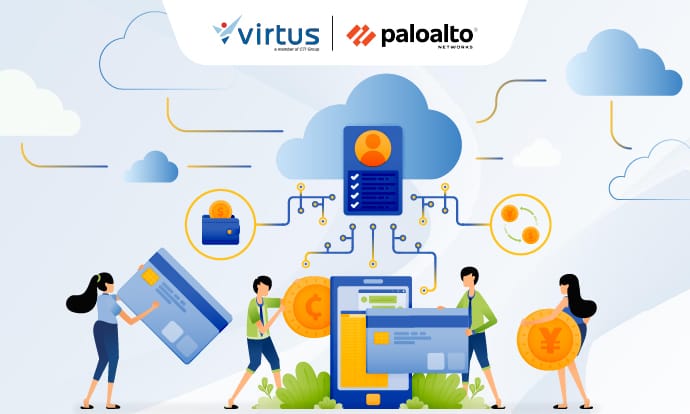Cloud banking has now become the foundation for digital transformation in the financial sector, changing the way banks and financial institutions operate. Flexible and efficient cloud technology allows banks to enhance services, reduce costs, and innovate quickly to meet the ever-evolving needs of customers.
Migrating to the cloud enables banks to scale services, manage data more easily, and provide secure digital access 24/7. However, adopting cloud services also requires significant attention to the security of sensitive data and compliance with regulations.
In this article, we will discuss how cloud banking works, the challenges faced, and the main reasons behind this major shift in the financial industry.
What is Cloud Banking?
Cloud banking is the use of cloud computing technology in banking to manage data, transactions, and financial services more efficiently and flexibly. Instead of relying on physical servers, banks can take advantage of cloud services from providers such as AWS or Google Cloud, making operations more cost-effective and adaptable to their needs.
With cloud banking, banks can innovate faster and launch new products more easily, as cloud technology allows for more practical development and testing. The cloud also enables banks to quickly scale services when demand surges, such as during holiday seasons.
While attractive, cloud banking still faces challenges around security and regulations. Banks must ensure customer data remains secure and complies with rules through strict encryption and two-factor authentication.
Why is Cloud Banking Important in the Digital Age?
Cloud banking has become crucial in the digital age because it helps banks meet the demands of modern consumers who want fast, secure, and flexible financial services. By using cloud technology, banks can innovate faster to deliver products and services that are responsive to market needs, such as mobile banking, digital payment services, and personalized analytics.
Additionally, cloud banking allows banks to improve operational efficiency and reduce costs. Cloud technology helps banks minimize expenses on physical IT infrastructure and system maintenance. With these savings, banks can focus on improving service quality and developing new products, giving them a competitive edge in an ever-changing industry.
5 Benefits of Cloud Banking for the Financial Industry
Here are the five key benefits of cloud banking for the financial industry:
1. Operational Cost Efficiency
Cloud banking reduces the need for significant investment in physical IT infrastructure, thus saving on long-term maintenance and operational costs.
2. Scalability and Flexibility
Banks can quickly increase or decrease service capacity as needed, for example, during periods of transaction spikes.
3. Access to Advanced Technology
The cloud makes it easier for banks to use cutting-edge technologies like big data analytics, AI, and machine learning to enhance services and understand customer needs.
4. Stronger Data Security
Cloud providers typically offer encryption, authentication, and advanced security monitoring, helping banks protect customer data from cyber threats.
5. Faster Innovation
The cloud enables the development, testing, and launch of new products or features much more quickly, supporting banks in innovating within a competitive market.
How Do Cloud Banking Platforms Work?

Cloud banking platforms work by shifting banking IT infrastructure to cloud-based systems, enabling various services and data to be accessed, managed, and processed remotely. These platforms use cloud technology to support banking operations like data storage, analytics, security, and providing digital services to customers.
In practice, banks use the type of cloud that suits their needs (private, public, or hybrid) to meet their security and service scalability requirements. Data and applications in the cloud are also equipped with encryption and security protocols, ensuring both security and flexibility for banks.
The Evolution of Cloud Banking
Cloud banking has evolved rapidly, starting from basic data storage to becoming the core management hub for more complex and modern operations. Initially, banks adopted the cloud as a solution to cut costs and improve efficiency.
However, with the rise of digitalization, cloud banking has transitioned from basic data storage to a platform capable of supporting AI-driven innovation, service personalization, and process automation. This evolution has also been driven by the need to comply with strict regulations, meet the demand for fast service access, and enhance security.
Private Cloud
A private cloud is an exclusive cloud infrastructure used by a single organization, in this case, a bank. In a private cloud, the bank has full control over data and applications, allowing for tighter security and compliance settings.
Private clouds are ideal for banks dealing with sensitive data or operating in heavily regulated environments, as this restricted access adds an extra layer of security and ensures that data is not mixed with other users on public clouds.
Public Cloud
Public cloud refers to cloud services managed by external providers such as AWS, Google Cloud, or Microsoft Azure and shared among multiple organizations. In the banking context, public cloud offers high flexibility and access to the latest technologies at lower costs, as the infrastructure is shared among many users.
Although it carries higher security risks compared to private cloud, many public cloud providers comply with strict security and regulatory standards.
Hybrid Cloud Environments
Hybrid cloud combines private cloud and public cloud, allowing banks to manage highly sensitive data in a private cloud while leveraging the advantages of the public cloud for other applications.
Examples of Cloud Banking in the Financial Industry

Examples of cloud banking in the financial industry include several innovations that enable banks and financial institutions to adapt more quickly to customer and market needs. Here are a few examples:
1. Mobile Banking and Digital Wallets
Many banks use the cloud to support mobile banking apps and digital wallets (e-wallets) that enable customers to perform financial transactions quickly and securely. The cloud helps these apps remain accessible with stable performance, even when user numbers surge.
2. Data Analytics and Personalized Services
The cloud enables banks to analyze big data from customer transaction histories and preferences. With this data, banks can offer more personalized services, such as investment product recommendations, loans, or savings plans tailored to customers’ profiles and needs.
3. Automated Customer Support with AI
Many banks now use AI-powered chatbots on cloud platforms to serve customers 24/7. These chatbots can answer common questions, provide simple assistance, and direct customers to the appropriate services, improving efficiency and customer experience.
4. Data Backup and Disaster Recovery
Cloud banking is also used for secure data storage and disaster recovery. In the event of a system failure, data in the cloud allows banks to quickly restore operations without major disruptions, ensuring service continuity for customers.
5. Faster Product Development and Launch
The cloud allows banks to develop, test, and launch new products or features in a shorter time frame. For example, new features in banking apps or payment systems can be quickly tested in the cloud without the need to build new infrastructure, speeding up innovation in the financial industry.
Challenges in Implementing Cloud Banking Systems
While cloud banking offers many benefits to the banking industry, it also presents challenges in its implementation, particularly around security and compliance. Banks and financial institutions migrating to the cloud must ensure that highly sensitive customer data remains protected and complies with various regulations, both local and international.
With the vast amount of data processed and stored in the cloud, the threats to personal data and transactions increase. Additionally, the cloud environment, which consists of multiple providers and models (public, private, hybrid), can make visibility and control more difficult. Banks need to ensure that security policies are consistently applied across all platforms and that data is not easily accessible by unauthorized parties.
Another issue banks face is compliance. Cloud banking requires banks to ensure that their systems can meet different regulatory requirements, such as GDPR in Europe or the PDP Law in Indonesia.
Read More: Indonesia’s National Data Center Hit by Cyberattack: Here’s What Your Business Needs to Prepare
Introducing Palo Alto Networks as a Cloud Security Solution for Banking
Palo Alto Networks is a leading security vendor offering comprehensive protection for applications, data, and infrastructure across various cloud providers. One of its flagship solutions, Prisma Cloud, delivers enhanced visibility across the entire cloud environment. Prisma Cloud helps organizations manage and monitor risks and threats that may arise at any time.This solution is compatible with major cloud providers, including Amazon Web Services (AWS), Microsoft Azure, and Google Cloud, and ensures consistent security policy management across all these environments.
Prisma Cloud is not just a tool for monitoring threats or data leaks; it is also a platform that enables automation of security policies across all cloud platforms—whether public, private, or hybrid. This is especially important for banks that require scalable solutions that can adjust to their continuously evolving operational needs.
Main Features and Advantages of Palo Alto Prisma Cloud
1. Cloud Security Posture Management (CSPM)
This feature serves as a comprehensive monitoring system to ensure your cloud’s security. CSPM proactively monitors security, detects threats, and ensures compliance across various cloud platforms. Its key components include:
- Visibility, Compliance, and Governance: Provides detailed reports on cloud activities and compliance levels with standards.
- Threat Detection: Detects suspicious activities and provides rapid responses before threats escalate.
- Cloud Discovery and Exposure Management (CDEM): Maps risks and exposure of your cloud assets.
2. Cloud Workload Protection (CWP)
Cloud Workload Protection ensures the security of all workloads, ranging from virtual machines to containers and serverless applications. Its components include:
- Vulnerability Management: Identifies system vulnerabilities and provides guidance for mitigation.
- Run-time Security: Ensures application security during execution.
- Access Control and Anomaly Detection: Strictly manages access and detects unusual activities.
- Essential Security Modules Provided:
- Host Security
- Container Security
- Serverless Security
- Web Application and API Security
3. Cloud Application Security
This feature is designed to protect applications from security threats originating within the cloud ecosystem. Key focus areas include:
- Infrastructure as Code (IaC) Security: Detects vulnerabilities in infrastructure code such as Terraform or CloudFormation.
- Software Composition Analysis (SCA): Analyzes the security of dependencies, including open-source packages and libraries.
- Secrets Security: Protects sensitive data like API keys and credentials.
- CI/CD Security: Ensures the application development pipeline remains secure from start to finish.
4. Cloud Infrastructure Entitlement Management (CIEM)
CIEM is designed to provide visibility into cloud entitlements. With this feature, organizations can effectively manage permissions, identify risky privileges, and deliver automated responses. Its main component:
- IAM Security: Monitors and reduces the risks of unused or excessive permissions.
5. Data Security Posture Management (DSPM) with AI Security Posture Management (AI SPM)
This feature leverages AI to provide advanced data protection with capabilities such as:
- Discovery and Classification: Identifies and classifies sensitive data.
- Data Protection and Governance: Manages and protects data from ransomware threats while ensuring compliance.
- Threat Prevention: Prevents data leaks or misuse of sensitive information.
Build Your Cloud Banking Security Strategy with Virtus
Virtus Technology Indonesia (Virtus), as an authorized distributor of Palo Alto Prisma Cloud, offers integrated security solutions to protect your cloud banking applications and data. As part of the CTI Group, Virtus has extensive experience and a certified engineering team ready to assist you in implementing leading technologies to strengthen your digital security systems.
With Prisma Cloud from Palo Alto Networks, Virtus provides advanced security protection, including full visibility into your cloud infrastructure, protection for sensitive data, and the ability to automate threat detection and response. Additionally, this solution supports unified security policy management across different cloud environments, whether public, private, or hybrid. This combination ensures that all data and applications in your cloud banking remain protected from potential threats.
Virtus is ready to assist you with tailored solutions, ensuring that your cloud banking security strategy is maintained, even amid the challenges of digital transformation. Contact Virtus Technology Indonesia (Virtus) now for a consultation and begin your secure and protected digital transformation journey.
Author: Ary Adianto
Content Writer, CTI Group



























